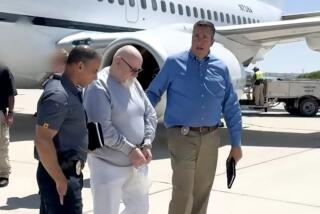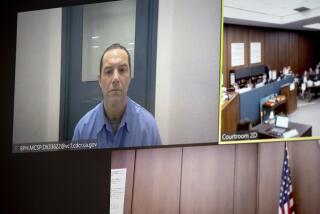Kraft’s Attorneys Ask Permission to Set Up Crime Lab
- Share via
Attorneys for Randy Steven Kraft, who is charged with 16 Orange County murders, asked a judge Friday to let them set up a laboratory for a seven-month to one-year examination of physical evidence in the case.
It was the first public hint that the court-appointed defense attorneys don’t expect to be ready for Kraft’s Jan. 12, 1987, trial date.
One of the defense attorneys, C. Thomas McDonald, said later that “we’re working just as fast as we can to be ready.” But a defense criminalist, Robert Ogle of San Francisco, told Superior Court Judge James K. Turner that it would take at least seven months, and perhaps up to a year, for the defense to conduct independent examinations of some of the prosecution evidence against Kraft.
Because Kraft’s attorneys are court-appointed, all the expenses of the defense are paid by the county. McDonald would not say how much the proposed testing would cost.
Turner set an Oct. 10 hearing date on the defense request when prosecutors said they needed time to study the implications of the proposal.
When Kraft, now 41, was arrested May 14, 1983, on a traffic violation, California Highway Patrol officers found a dead Marine in the front seat of his car. Within the next few weeks Kraft was charged with 16 murders of young men over an 11-year period.
Prosecutors say he is also responsible for 21 other killings, including six in Oregon and two in Michigan, but he has not been charged with those.
Kraft’s attorneys say there are about 7,000 pieces of evidence they must go through to decide what tests need to be conducted. The usual procedure in such matters is for defense lawyers to have their own criminalists examine evidence at the Orange County Sheriff’s Department crime laboratory.
But McDonald said the county’s crime lab is too crowded and can’t provide the confidentiality the defense teams needs to do its own tests.
The defense proposed a 1,000-square-foot crime lab with equipment to conduct a variety of tests similar to those law enforcement officials have already conducted. McDonald would not go into specifics, but the police tests included tests for fingerprints, hair fibers, carpet fibers, and blood.
Request for Facilities
Larry Ragle, director of forensic science services for the Sheriff’s Department, told the court that the county has plans for a laboratory for use by defense attorneys in criminal cases, but there have been no funds available for it so far.
“There really isn’t any place for us to do the work we need to do at the county crime lab,” McDonald said. “I think the judge is going to have to approve some kind of plan for us so we can examine the evidence.”
Deputy Dist. Atty. James P. Cloninger told the court that sheriff’s officials object to evidence leaving their custody.
McDonald proposed that the court appoint a master criminalist who would be responsible for preserving the evidence once it leaves the county facility. Cloninger expects to answer that suggestion at the Oct. 10 hearing.
Cloninger said he had been aware of the defense attorneys’ desire for their own crime lab but was surprised at some of the details he heard in Friday’s proposal. One surprise was that the defense apparently won’t be ready for trial in January.
Concern About Time
“That’s a primary concern to us,” Cloninger said. “What have those guys been doing for 3 1/2 years?”
Kraft’s present lawyers have been on the case a little more than two years. McDonald says they have done a great deal of work in that time.
Even if the crime lab proposal is rejected by the judge, the defense attorneys said Friday that they will need time to conduct tests on the evidence under some other arrangement. Papers they filed with the court estimated that testing could take 11 months.
More to Read
Sign up for Essential California
The most important California stories and recommendations in your inbox every morning.
You may occasionally receive promotional content from the Los Angeles Times.













